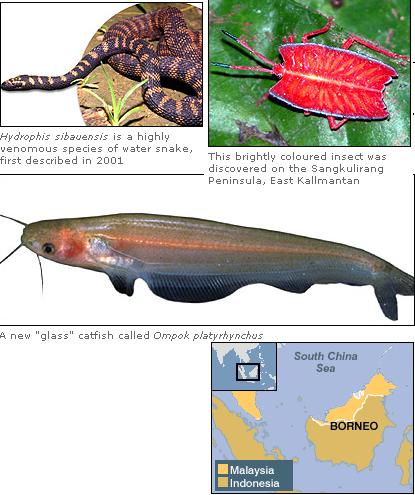News and voila!

Direct link to this page: https://www.hayadan.org.il/borneo040505.html
Jakarta. 361 unknown species of animals, including probably the largest cockroach in the world and 30 types of freshwater fish, have been discovered on the island of Borneo in the last decade, and thousands more are still waiting to be identified, according to a report published Tuesday by the World Wildlife Fund (WWF). The report even warns that many of these animals are in danger of extinction due to illegal logging. The fund calls on the countries that share the island to support a multinational project to protect one of the largest virgin forests in the world, which have not yet been irreversibly damaged.
Among the insects identified, a ten-centimeter-long cockroach, which was discovered last year in a cave on the Sangkulirang Peninsula in East Kalimantan, the Indonesian part of Borneo. "Considering that cockroaches are one of the oldest insects, the discovery of the 'giant' is for entomologists (insect researchers) a discovery comparable to finding five living tyrannosaurs-rex," the report states.
Two other high points were in 2000, when it turned out that the orangutan from Borneo is not of the same species that lives in Sumatra, and that the Bornean dwarf orangutan is actually a separate local subspecies. The previous explanation was that the British brought the elephants from India to Borneo, about 350 years ago. "It is clear that more research is needed regarding the new species in Borneo," said Amelia Firman of the International Conservation Organization.
In order to protect the biological treasures found, the various organizations for the protection of the environment and wildlife decided to cooperate with Indonesia, Malaysia and Brunei, the three countries that share the island, to establish a reserve over an area of 220 thousand square kilometers called the "Heart of Borneo", a forest until most of its trees grow in mountainous areas.
"This is an area that is still in its natural state from an environmental point of view," said WWF's Nita Morjani. Already today it has protected parts, and we are trying to create a package deal of several projects". In the "heart of Borneo" are most of the large river basins of the island. "If these disappear, the whole island will be destroyed," Morjani said.
The representatives of the three countries held their first working meeting this month, and it seems that the vision will come true. However, until a final decision is made on the matter, deforestation continues, according to environmentalists, at the rate of six football fields per minute, with most of it being done illegally.
Protected areas are at risk like any other, said Sam Lawson of the Environmental Research Agency. "We have evidence of extensive, unorganized and illegal logging in national parks in Kalimatan and Sarawak," he said. Sarawak is one of the two Malaysian provinces in Borneo.
Lawson said that the fact that the "heart of Borneo" is in a mountainous area means that the place is not in immediate danger. "But, if the governments do not curb the illegal cutting and the consumers do not refrain from buying the products of the trees that have been cut down - the loggers who work against the law will end up there too."
John Aglioneby, Guardian, Walla News!
For news at the BBC
They know endangered animals
https://www.hayadan.org.il/BuildaGate4/general2/data_card.php?Cat=~~~148071075~~~32&SiteName=hayadan
